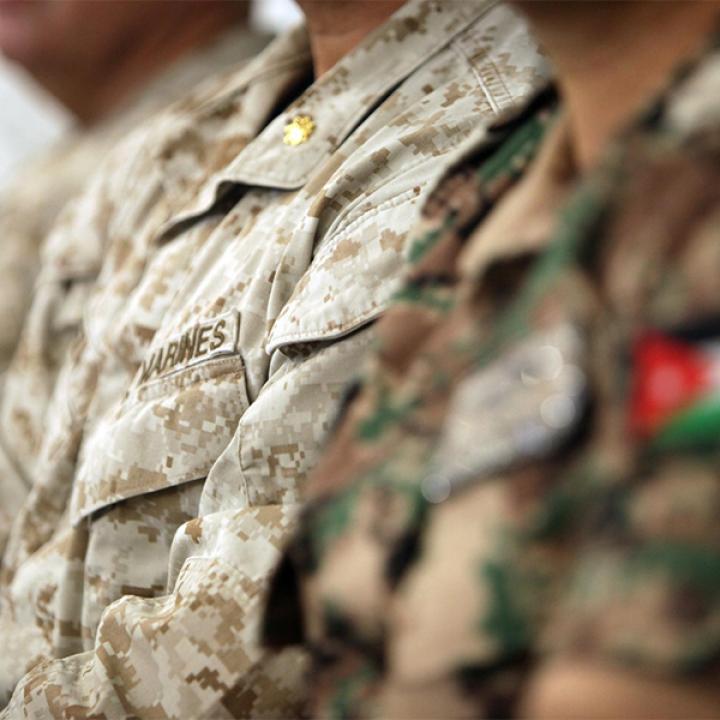
- Policy Analysis
- Articles & Op-Eds
Jordan's Fight Against the Islamic State Remains Complicated

Threatened by ISIS and beholden to Washington, Amman will continue to play a critical role in the coalition, but its involvement comes with a domestic political cost.
In a grim interview last month with the Islamic State in Iraq and Syria's online magazine Dabiq, Moath al Kasasbah -- the Jordanian pilot shot down and captured during a recent bombing run over Syria -- was asked if he knew what ISIS would do to him. "Yes," he said, "they will kill me."
Regrettably, Kasasbah is probably correct. Although he is a devout Sunni Muslim who reportedly made the Haj to Mecca just prior to his fateful sortie, ISIS shows little compunction in dispatching its co-religionists. And if Kasasbah wasn't already doomed, Jordan's pivotal role -- serving as a regional base for air operations -- in the U.S.-led anti-ISIS coalition likely sealed his fate.
Jordan's first military casualty at the hands of ISIS executioners could complicate Amman's already unpopular involvement in the coalition. Many if not most Jordanians oppose the central role the kingdom is playing in the campaign against ISIS. Among the nearly 98 percent of Jordan's population that is Sunni Muslim, there is broad sympathy for the revolt in Syria against the nominally Shiite Assad regime. To date, more than 200,000 mostly Sunnis have been killed in the war, in which ISIS stands as the most militarily effective rebel force. Perhaps because of this dynamic, according to a poll published in September by the Center for Strategic Studies at the University of Jordan, only 62 percent of Jordanians consider ISIS to be a terrorist organization.
To be sure, Jordanians understand that ISIS's goal of establishing a region-wide caliphate incorporates the kingdom. Although security forces in the kingdom have already arrested hundreds of suspected ISIS members and sympathizers, at present the dominant view -- articulated last year by twenty-one members of parliament and by an increasingly popular Jordanian Twitter hashtag -- is that "This war is not our war."
Whose war is it? Jordanian Islamists say the objective of the fight against ISIS is to protect Israel and is yet another American "campaign against Islam." According to prominent left-wing Jordanian columnist Lamis Andoni, Jordan has been blackmailed into participating. Involvement in American wars, she wrote on December 30, has become "an implicit prerequisite for economic growth and [the continued] flow of aid" to Jordan. Not everyone in Jordan agrees with Andoni, but her column highlights the sensitivities of the anti-ISIS campaign -- and the capture of Kasasbah -- for the Jordanian government.
Jordan, never well known for transparency, has been especially reticent to discuss details of its role in coalition operations and is saying even less about Kasasbah. Like the vast majority of his fellow troops, Kasasbah hails from a Jordanian tribe, the segment of the population long considered the most loyal to the monarchy. Until recently, Amman had been trying to quietly negotiate his release via cross-border tribal contacts. Not surprisingly, though, the effort fell short as ISIS was demanding Jordan's withdrawal from the coalition in return for the safe return of the pilot.
Just days ago, unconfirmed reports suggested that U.S. forces had entered ISIS-controlled Raqqa in an aborted attempt to rescue Kasasbah. Given his likely fate, few would criticize Washington and Amman for trying, but the operation was nonetheless a big risk. After all, if Kasasbah had been killed during the mission, it could refocus blame on the government and generate a new round of anti-U.S. recrimination.
For the time being, at least, it appears that Kasasbah's capture is generating a rally-around-the-flag effect in Jordan. "Suddenly," Jordanian political analyst Oraib Rantawi recently observed, "most if not all of Jordanian families felt like they had a son named Moath Kasasbah." Regardless of whether one agrees with or opposes the war on ISIS, Rantawi says, Jordan is witnessing "a higher degree of cohesion and unity behind the army, the air force, and Moath and his family."
In the short term, this "we are all Moath" sentiment will buoy support for Jordanian kinetic operations against ISIS in neighboring Syria. But after Moath is gone -- beheaded or somehow miraculously returned home alive to his family in the kingdom -- Jordanians are likely to resume their criticism of the government and the King's palace for what they believe to be an ill-advised and open-ended campaign. Meanwhile, as Jordanian casualties inevitably mount, so too will domestic -- and perhaps even tribal -- opposition to Jordan's involvement.
Much like al Qaeda's 2005 hotel bombings in Amman turned an ambivalent population against Bin Laden, it's possible that a successful ISIS terrorist attack in Jordan would shift public opinion in favor of the war. It's equally conceivable, however, that such an attack would be seen as retaliation for the kingdom's coalition activities.
Threatened by ISIS and beholden to Washington, Jordan will continue to play a critical role in the coalition. But the kingdom's involvement comes with a cost. Absent significant progress in rolling back ISIS, participation in the coalition joins a growing list of popular Jordanian grievances that include a moribund economy, the deal to purchase natural gas from Israel, planned construction of two nuclear power plants, and endemic corruption. Given the slow tempo of air operations and the ongoing territorial expansion of ISIS, the war is likely to remain a source of contention in the kingdom for some time.
David Schenker is the Aufzien Fellow and director of the Program on Arab Politics at The Washington Institute.
Weekly Standard



